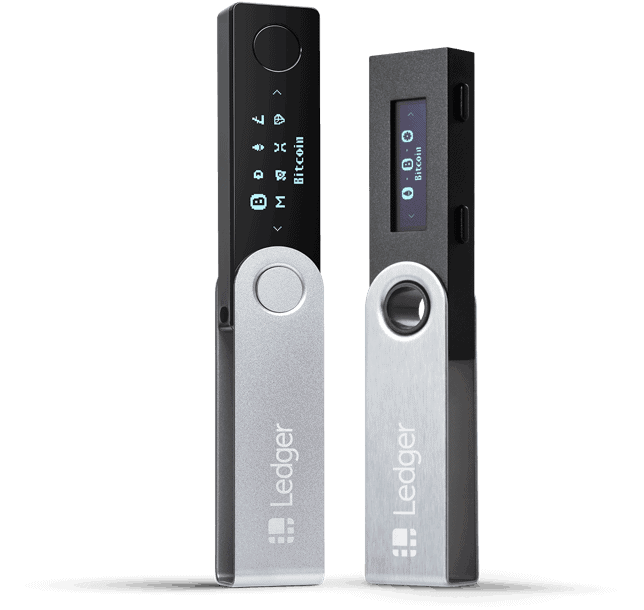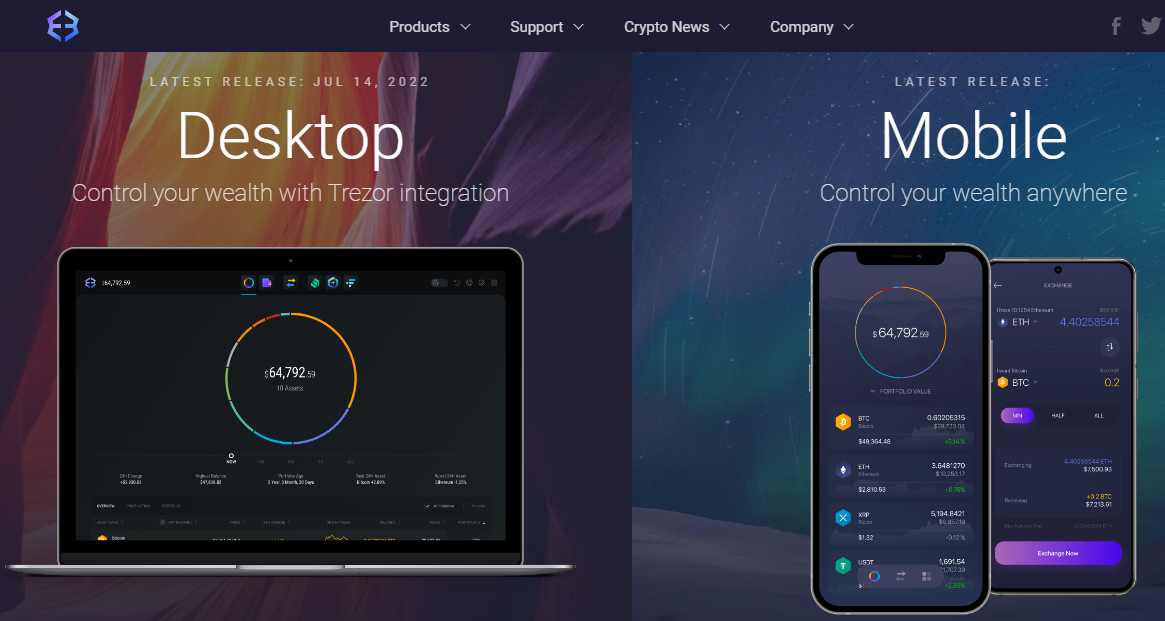TLDR
Staking is a simple process of helping a blockchain network maintain security and legitimize all transactions by keeping some digital tokens on the platform. In return, the blockchain rewards the asset holders in tokens or fee percentages.
Depending on the best crypto wallet of your choice, you can earn high profits, and some blockchains give governance tokens as part of their rewards.
Considering all the essential factors for selecting the best crypto wallet for staking, we present our top 7 picks of the best crypto wallets:
- Coinbase
- Electrum
- Ledger Nano X
- Atomic wallet
- Cake Defi
- Trust Wallet
- Exodus
Introduction
The growth and evolution experienced in the cryptocurrency world since its introduction to the market have been like no other in history. One of the most memorable points of the crypto evolution occurred in 2019.
Before 2019, mining was one of the best ways to earn rewards or profits besides trading. The mining system used a Proof-of-Work method, rewarding you based on the number of assets you can mine within a specific time frame.
However, in 2019, there was a shift from the POW system to the POS system. The POS system is based on allowing users to earn rewards passively and based on consensus.
This change attracted many more investors, and as more people understood the ease of Staking and the staking rewards, the more people wanted to learn.
Let’s learn about staking and the best crypto wallet for staking.
What Is Staking?
Staking is a reward system in the crypto world where users can earn interest and make profits by holding some digital asset in a particular wallet. The blockchain network then uses these tokens to help other users transact easily and secure the network.
In the traditional banking system, it’s similar to leaving some funds in your bank account for the bank to use and earning some interest over time. The interest rates can differ from bank to bank. The same applies to blockchains as well.
Staking keeps a blockchain network safe. The availability of tokens users leave for the blockchain to use when needed is a great way to help keep the network running. These tokens are held in a crypto wallet, equivalent to a bank account.
The Best Crypto Staking Platforms
Here are some of the best crypto wallets for your tokens based on their performances according to the abovementioned factors.
1. Coinbase

Overview Of Coinbase Wallet
The Coinbase wallet has several attributes that make it one of the best staking platforms in the market. It has a relatable and intuitive design that is great for beginners who might have difficulty navigating a staking platform for the first time.
Supported Coins and Payment Methods
You can connect with many banks from your Coinbase wallet and conduct transactions with digital assets like BTC, Dogecoin, ETH, and more.
If you add all the tokens up, you realize that you can connect to more than 5500 supported coins from your Coinbase wallet, making it one of the best crypto-staking wallets on the market.
Wallet – Best for Beginners:
The Coinbase exchange network significantly differs from the Coinbase wallet. The Coinbase exchange is one of the most used crypto-staking platforms in the United States. It is one of the best platforms to buy, sell, stake, or conduct other transactions with your digital assets.
Thankfully, the Coinbase wallet operates as a non-custodial platform, providing you with your private keys for secure storage instead of keeping them on the platform, where hackers might access them. The security of your crypto tokens is, therefore, dependent on you.
Pros
- Its simple interface makes it beginner friendly.
- It supports more than 5500 tokens.
- It places priority on security.
- A robust platform backs it.
- It gives you broad access to other Decentralized apps
Cons
- It is not available on desktops or any other device that isn’t a mobile or tablet device.
- It has the same weak security spot as any other hot wallet.
More details
With Coinbase Wallet, you can access a mobile app and browser extension, enabling seamless support for numerous cryptocurrencies. Moreover, it offers built-in functionality to interact with decentralized applications, allowing you to participate in staking, yield farming, and non-fungible tokens (NFTs). This wallet caters to existing Coinbase customers and crypto investors seeking a user-friendly digital wallet option.
-
Seamless fund transfers from Coinbase exchange.
-
Extensive range of supported cryptocurrencies.
-
Access DApps, staking, and NFT marketplaces.
-
No cold storage integration.
-
Lacks educational material.
-
Limited NFT support.
2. Electrum – Best Desktop Software for Bitcoin wallet

Overview Of Electrum
Since Electrum was founded in 2011, it is one of the remaining crypto wallets to deal exclusively in Bitcoin. The Electrum software wallet was built specially to support the BTC tokens.
Security features of Electrum
It remains a top-choice wallet because of its robust security features and how far you can go with personalizing its features.
Its extensive security features cut across several processes, including multiple signatures, support, 2FA, and proof-checking for every transaction.
Unique features of Electrum
One of the unique features of the Electrum software is how the speed of transactions depends on how much users are willing to pay for faster results. Essentially, the more you are willing to pay, the faster your transaction.
You can also download the lightweight software version for a faster setup, which takes up less space on your desktop.
The software doesn’t download every part of the blockchain; it only downloads the parts necessary for the payment using the Simple Payment Verification (SPV) system.
Pros
- It is easy and quick to setup
- Its server configuration minimizes downtime experiences on the network.
- It has one of the best security for any wallet on the market.
- Users can determine the speed of every transaction they conduct depending on how much they are willing to pay.
Cons
- Users can’t get customer service support via phones or emails.
- Its user interface is not beginner friendly.
3. Ledger Nano X – Best Hardware Wallet

Overview Of Ledger Nano X
Ledger is one of the leading crypto-staking wallets. Anyone can choose to stake crypto for many reasons, but one reason that stands out is its extra security.
Security features of Ledger Nano X
Ledger uses the same high-security tool and chip component in credit cards, passports, and other payment tools. In addition, it adds external security to your hardware wallet.
While you can stake on this platform using the live ledger app, you can also use a Ledger device or the desktop application.
How to stake on Ledger Nano X
It is important to mention that the live app only supports Tezos (XTZ) staking while staking for other tokens requires a Ledger device and compatible third-party apps.
The Ledger software affords users more control over their Staking and activities through more transparency. In addition, users can pick a validator from numerous options, which helps them stake crypto correctly.
This process further strengthens the decentralized feature of the app and helps users gain control over the safety of their crypto coins.
Unique features of Ledger Nano X
The Ledger staking wallet is pocket friendly and is made of high-quality steel and plastic. In addition, the device has a long-lasting battery that can last for days after a single charge because of its 100mAh lithium-ion power supply.
The Ledger Nano X significantly improved from the earlier versions of the hardware wallet and charged no transaction fees. In addition, the device is sleek and with an excellent user Interface.
It’s also fun that part of your staking rewards on Nano X is awards given to you for holding digital assets on the digital wallet.
Pros
- It prioritizes its wallet’s security
- It supports different internet devices.
- It has a simple and sleek design that makes transactions easy
- You don’t have to pay transaction fees
Cons
- It requires third-party apps for maximum efficiency.
- The Live app has very limited capacities.
More details
The Ledger Nano X is a must-have, secure hardware wallet for cryptocurrency. It features easy mobile pairing, a sleek design, Bluetooth support, and robust security features like a safe chip and two-factor authentication.
-
Supports 5500 various cryptocurrencies.
-
Private keys are encrypted.
-
Desktop and mobile devices are supported.
-
Bluetooth enabled.
-
Allow 100 apps storage.
-
Fairly overpriced against the competition.
-
Only 100 apps are allowed.
-
Bluetooth works solely with mobile.
4. Atomic Wallet

Overview of Atomic Wallet
The Atomic cold wallet has one of the best features in the market because it allows users to perform every possible transaction without leaving the app.
Features of Atomic Wallet
Other cold storage wallets on the blockchain ecosystem mostly require other third-party apps for efficiency.
How to stake on Atomic Wallet
The staking process on the Atomic wallet is straightforward; it requires no complicated steps or documents. Once you have opened an account, get to the staking page, select the particular crypto token, and confirm how much you want to add to your staking wallet.
Pros
- Excellent User Interface
- A helpful guide for each coin
- No need for an external or third-party app
Cons
- Limited staking options
- Limited staking rewards as a result of the limited options
More details
Atomic Wallet offers a user-friendly and polished platform for managing crypto assets effectively. It boasts support for numerous cryptocurrencies and allows you to earn rewards by staking more than a dozen. Additionally, the wallet features a convenient built-in exchange and the ability to purchase cryptocurrencies. Nevertheless, there are some security concerns surrounding the wallet.
-
Diverse device compatibility.
-
Over 500+ crypto assets supported.
-
Easy to use for all investors.
-
Encrypted private keys are stored on your device.
-
Lacks hardware wallet integration.
-
Limited crypto buying services.
-
Vulnerable for hacks.
5. Cake Defi Staking Platform
Overview of Cake Defi
There are different reasons why different crypto-staking wallets stand out and for Cake Defi, its transparency.
This crypto wallet updates users and investors with quarterly reports, including projections, growth achieved, rewards awarded, etc.
Transparency of Cake Defi
This level of transparency is uncommon in the crypto world and is very helpful to users and crypto investors.
How to stake on Cake Defi
Regarding staking, the APY also includes information about each coin, including all the fees required and rewards to be earned. You can also easily un-stake tokens with a single click on this platform.
On the Cake Defi platform, you can also use a node address to check for past transactions, earn high rewards as passive income by their auto-compounding, and begin your crypto Staking without a minimum balance.
Pros:
- High staking rewards
- Information transparency
- No minimum amount is required before crypto staking
- Access to past transactions
Cons:
- One-click un-staking is unsafe for a crypto wallet
- Relatively high transaction fees
6. Trust Wallet

Overview of Trust Wallet
Trust Wallet is one of the best staking platforms, especially among wallets available for Mobile Devices. This one stands out from other available wallets because of its scannable user interface, its list of supported coins, NFTs, and Decentralized Apps.
The trust wallet is backed by one of the most robust and popular global exchange networks, Binance.
While an extensive exchange network backs the Trust cryptocurrency wallet, it remains non-custodial. This means private keys are not stored on the network but with individual users.
Features of Trust Wallet
It has over 4.5 million supported coins and tokens that you can store seamlessly across 65 blockchains.
The Trust Wallet mobile app also has integrated Web 3 apps and games that users can access directly. This means you can explore NFT channels, buy assets, and store tokens without leaving the app or using a third-party app.
The Binance network’s backing means you can purchase many tokens without using credit or debit cards.
Pros
- It has a wide range of supported coins
- In-built Web 3 apps and games
- Simple and easy user interface
Cons
- The Binance Exchange has multiple regulatory challenges in the US
- Limited educational/informative resources
7. Exodus Wallet

Overview of Exodus Wallet
The Exodus crypto wallet has many admirable features, including speedy transactions, flexible functionalities, and easy processes for expert users and beginners.
The Exodus digital wallet is an excellent tool for beginners without experience with staking platforms or processes.
More than 290 crypto and NFT tokens are supported on the Exodus blockchain, including ETH, BTC cash, Dogecoin, Shiba Inu, and much more.
The design and User Experience on the Exodus platform has great visuals and intuitive designs with no complexities. The platform is also highly compatible with Trezor Wallets.
Features of Exodus Wallet
The Exodus is available on all operating systems, including IOS and Android devices. This means that it is inclusive of everyone, allowing anyone with any device across all operating systems to earn passive income on their tokens.
However, the Exodus wallet desktop application remains the best way to transfer crypto and earn staking rewards on the Exodus platform, especially because it gets upgraded bi-weekly.
You also do not have to worry about how heavy the application is because it runs on a lightweight basis, meaning that it doesn’t download parts of the blockchain that aren’t needed for transactions.
Several apps are being created to support various functionality on this digital wallet, like crypto staking, crypto deposits, and live charts.
Pros:
- It is compatible with the Tezor wallet.
- There are over 290 coins that can be staked.
- It remains One of the few crypto wallets that doesn’t require credit cards for payments.
- Its customer service support is top-notch.
Cons
- Its security system is relatively weak.
- The transaction fees are relatively high.
7 Factors To Consider Before Choosing Crypto A Staking Platform
Choosing the best crypto and trust wallet can be overwhelming, as many staking platforms exist.
We have compiled important factors to look out for before picking a staking platform:
1. Flexibility/Compatibility
One prominent feature good staking wallets should have is the flexibility to function on any internet-enabled device.
This allows a wide range of users across multiple software to access the staking platforms, including IOS, Linux, Android, and Windows.
Ensure that you pick a wallet that supports different software and is compatible with your device(s).
2. Multiple Cryptocurrencies
Ensure your crypto wallet supports multiple currencies or tokens.
A digital wallet supporting other cryptocurrencies helps you earn passive income from multiple tokens.
3. Invisibility/Transparency
Invisibility and transparency are critical security features of any staking platform.
You want a trusted wallet that will keep your transactions private, protect your account information, or keep you anonymous.
Ensure your wallet choice supports extensive security features that protect your public and private keys well.
4. Security features
A crypto-staking wallet’s best attribute is high security. Before picking a crypto wallet, you must be assured that it’s a dedicated staking platform that does its best to save your tokens from cyberattacks.
All crypto exchanges are online and, therefore, susceptible to theft, viruses, and cyberattacks.
Some of the best security features to look for include user authentications sent when suspicious activities are noticed. This helps ensure the safety of stored tokens and gives users control of the activities conducted on the wallet.
5. Excellent Customer Service
Nothing beats a staking platform with consistent customer support service that offers excellent solutions and helps users feel safe in the face of mishaps. This is especially important for beginners.
6. Simple Userface
A simple user interface (UI) offers a smooth and easy experience with the staking process.
The best crypto-staking platforms don’t have complicated interfaces because the more straightforward the interface, the less likely for any hidden features that might cost users fees unaware.
7. Reputation
Reviews are one of the most important indications that a staking platform is good and legal. Conduct enough research before putting all your tokens in a digital wallet.
Types Of Staking Models
Different crypto-staking platforms and processes are designed for different purposes. Knowing the type of staking process you want helps determine the staking platform to use and the digital asset to stake.

Flexible Staking
Flexible Staking is a short-term staking process requiring that your tokens be locked for not more than seven days.
Fixed or Locked Staking:
The locked staking process has a 30-90 days staking limit and doesn’t grant access to users during this staking period.
Defi Staking
The Defi Staking process is strictly for Defi platforms or protocols. This staking process allows users to stake their tokens and invest assets in Defi protocols. This type of Staking isn’t for everyone, as market volatility means major user risks.
On and Off-Chain Staking
On-chain Staking is the normal staking process that rewards users on the POS system, while Off-chain staking processes allow rewards for users for transactions conducted outside the platform.
Self-Staking and Liquid Staking
Self-staking is when users must validate protocol nodes and verify transactions manually using required third-party tools. The only users allowed to participate in this process are those with a certain amount of assets held in their wallets.
Liquidity staking has a lot more freedom because it frees locked-up tokens after a set period.
Soft Staking
Staking allows users to earn rewards on their assets without locking them up.
What Is A Crypto Staking Wallet?
Crypto wallets are the storage rooms of digital assets, equipped with private keys that grant access to the holders of the cryptocurrencies and wallet owners.
Crypto wallets are used for storing, selling, buying, and holding cryptocurrency or assets like BTC, ETH, USDT, etc. The wallets are compatible with most internet devices and can be used on the go.
There are different digital wallets on the crypto platform like you have different accounts in the regular banking system. The types of wallets are loosely categorized into hardware and software wallets.
When deciding on what kind of wallet you need to get, one of the best determinants is the purpose for which the wallet is required. This is because each type of digital wallet has unique features, uses, and limitations.
However, all the different wallets have security features that help prevent external access to stored digital assets.
Types Of Crypto Wallets
There are three major cryptocurrency wallets, each with peculiarities that make them perfect for different purposes.
Paper Wallets

A paper wallet is the most basic type of staking wallet; it is usually a piece of paper with a private key or scannable codes for access.
Paper wallets are best for users storing their crypto assets for long-term use and those not looking to make active crypto funds from their tokens.
The security risks with paper wallets for crypto are enormous because the paper is very vulnerable to water, fire, or loss destruction.
Paper wallets can be tedious because of how long the private key can be; 256 characters.
Hardware Wallets

Hardware wallets digital wallets that store private keys on external hardware devices like USBs. They help users control their accounts’ safety because each user gets to keep their device.
Hardware wallets are offline, protecting users from cyberattacks when constantly connected to the internet. Users can plug in and unplug their hardware wallet when needed.
Software Wallets
:max_bytes(150000):strip_icc()/Crypto_Wallets_Review-0cfaf508fdaa42aaa8f5a9563e45300b.jpg)
Software wallets are the most popular and arguably the best crypto wallets. This is because they are always connected to the internet.
The constant connectivity of software wallets allows users to transfer crypto, earn rewards or perform other transactions easily and faster because it’s always on the go.
However, the risks of using software wallets are just as big as their advantages. The constant exposure to the internet makes the wallet and staked coins vulnerable to attacks.
Another security risk is people gaining access to a user’s unlocked device by stealing or borrowing. They can gain access to the user’s digital assets. This is why ensuring your devices are always locked with passwords is important.
Hot Wallets vs. Cold Wallets
To categorize the types of wallets obtainable, they are either hot or cold depending on their connection to the internet. Cold wallets are offline wallets that require no internet connection, e.g., paper wallets.
On the other hand, hot wallets require an internet connection. This makes it easier and more accessible than cold wallets because you can conduct transactions on the go. However, the same internet connectivity feature makes them susceptible to cyberattacks.

Hot wallets are the best option for people trading crypto coins for rewards. They are always accessible and, therefore, perfect for day-to-day transactions.
Cold wallets are perfect for long-term holders because they are not easily accessible. Like hot wallets, the same feature makes them highly resistant to hacks and attacks.
Users can get the best of both worlds if they have a cold storage or wallet for some tokens they want to hold long term and a hot wallet for constant transactions to earn rewards and passive income.
How to set up a crypto wallet
Setting up a crypto wallet is much easier after identifying why you need one. In addition, having a definite purpose helps streamline one’s options for opening wallets.
After researching and picking a wallet or the best crypto-staking platform of your choice, here is how to go about setting it up:
For Hot Wallets
- Choose the type of wallet you want and find a suitable option.
- Sign up on the software or device as required.
- Input all information, and set up all security requirements.
- You can begin depositing and transacting with your crypto assets.
- If your purpose for getting a wallet is crypto staking, you should store a certain amount of crypto assets before you are allowed to stake.
For Cold Wallets
- Buy the wallet: It is better to avoid indirect resellers. The best way to enjoy your cold wallet is to get it directly from the developer. This way, you can be assured there will be no tampering.
- Install Software: Every Cold wallet has software users must download on their hardware devices before use. Again, could you download this directly from the official site to avoid issues?
- Begin Deposit: Transfer assets from other wallets or staking pools into your hardware wallet. Some hardware wallets have integrated tools that allow users to trade and earn staking rewards while connected to a device.
Advantages of Crypto Staking
The most significant advantage of staking crypto is earning rewards from any crypto staking platform by having and holding digital assets.
Users of any crypto-staking platform earn rewards from fees paid by other cryptocurrency platforms and users. Users are also helping to secure the platforms they are staking their digital assets on, thereby ensuring the safety of their tokens as well.
Depending on the crypto staking platform of choice, users cans also be awarded governance tokens that give them a say in the future decisions of the best crypto Staking exchange on their chosen platform.
What Is The Tax On Staked Earnings?

Tax is one aspect of crypto exchange that most people either ignore or don’t have accurate information on.
The IRS treats these rewards on digital assets as properties instead of currencies and therefore requires tax on every sale, profit, and bitcoin transaction. This means you owe the government a percentage for any sale or profit from selling your staking rewards.
These taxes are to be calculated with the market value price of the period the tokens were received, not when the sale was made. This means that the rate of the digital asset at the time of receiving determines how much users will pay on income tax.
What Crypto Asset Has The Highest Staking Reward

BitDao is arguably the number one DAO (Decentralized Tokenized Autonomous Organization) globally.
Bit holders get their percentage rewards and still get voting rights on governance protocols that can determine the future of the asset.
Bit holders earn an annual return of as much as 14. 77%. This is quite rare in traditional investment and trading institutions.
Conclusion
Staking is a great way to secure networks in the same way mining is. However, Staking has gradually taken over the market due to several factors that make it easier and more beneficial to traders and investors.
More cryptocurrencies are being launched into the POS protocols by the day, leading to more profit from the process and more diversity in the market.
Every staking platform listed above is some of the best anyone can use for the reasons stated, and most of them are beginner friendly, so it’s OK if you are new to all this.
Yes, crypto staking can be profitable. You earn rewards for holding coins. Profits depend on the coin's value and staking rewards. Remember, there are risks involved.
Many wallets let you stake crypto. Some popular ones include Ledger, Trust Wallet, and Exodus. Always research and pick a secure wallet for staking.
The best place to stake crypto is a secure wallet or exchange. Look for platforms with high rewards and low fees. Examples are Binance, Kraken, and Coinbase.
The top crypto platforms for staking are Binance, Kraken, and Coinbase. They offer staking for various coins. Compare rewards and fees to find the best option.












